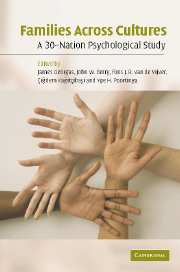Book contents
- Frontmatter
- Contents
- List of figures
- List of tables
- List of contributors
- Acknowledgments
- Prologue
- Part I
- Part II
- 9 The Algerian family: change and solidarity
- 10 Botswana
- 11 The Brazilian jeitinho: Brazil's sub-cultures, its diversity of social contexts, and its family structures
- 12 Britain
- 13 Bulgaria: socialism and open-market economy
- 14 Canada
- 15 Chile: new bottle, old wine
- 16 Cyprus
- 17 Portrait of family in France
- 18 Georgia
- 19 Germany: continuity and change
- 20 Ghana
- 21 Greece
- 22 Hong Kong, SAR China: transitions and return to the motherland
- 23 India
- 24 Indonesia: traditional family in a changing society
- 25 The Iranian family in a context of cultural diversity
- 26 Japan: tradition and change in the Japanese family
- 27 Mexico
- 28 Mongolia: traditions and family portrait
- 29 The Netherlands: tolerance and traditionalism
- 30 Nigeria
- 31 Pakistan: culture, community, and filial obligations in a Muslim society
- 32 The Saudi society: tradition and change
- 33 The South African family
- 34 South Korea
- 35 Spain: tradition and modernity in family structure and values
- 36 Turkey
- 37 Ukraine
- 38 Family in the United States: social context, structure, and roles
- Appendix
- References
- Index
19 - Germany: continuity and change
Published online by Cambridge University Press: 10 December 2009
- Frontmatter
- Contents
- List of figures
- List of tables
- List of contributors
- Acknowledgments
- Prologue
- Part I
- Part II
- 9 The Algerian family: change and solidarity
- 10 Botswana
- 11 The Brazilian jeitinho: Brazil's sub-cultures, its diversity of social contexts, and its family structures
- 12 Britain
- 13 Bulgaria: socialism and open-market economy
- 14 Canada
- 15 Chile: new bottle, old wine
- 16 Cyprus
- 17 Portrait of family in France
- 18 Georgia
- 19 Germany: continuity and change
- 20 Ghana
- 21 Greece
- 22 Hong Kong, SAR China: transitions and return to the motherland
- 23 India
- 24 Indonesia: traditional family in a changing society
- 25 The Iranian family in a context of cultural diversity
- 26 Japan: tradition and change in the Japanese family
- 27 Mexico
- 28 Mongolia: traditions and family portrait
- 29 The Netherlands: tolerance and traditionalism
- 30 Nigeria
- 31 Pakistan: culture, community, and filial obligations in a Muslim society
- 32 The Saudi society: tradition and change
- 33 The South African family
- 34 South Korea
- 35 Spain: tradition and modernity in family structure and values
- 36 Turkey
- 37 Ukraine
- 38 Family in the United States: social context, structure, and roles
- Appendix
- References
- Index
Summary
A HISTORICAL OUTLINE OF GERMANY
The history of the German nation begins with the constitution of the empire (Reichsverfassung) that the German constitutional national assembly approved March 28, 1849. The honor of the head of the German empire was awarded to a reigning German sovereign who held the title “Emperor of the Germans” (Kaiser der Deutschen) bequeathed to his descendants. The German Reich comprises three phases: the phase of the emperors from 1871 to 1918 with the Prussian Wilhelm II being the last emperor, the republic of Weimar (Weimarer Republik) from 1919 to 1934 with the presidents Ebert and von Hindenburg, and the Third Reich from 1934 to 1945 with Adolf Hitler being the president and the chancellor of the Reich in one person. It is noteworthy that the constitution of the Reich had a law that regulated that no German state within the Reich is allowed to apply a different legislation to other Germans which discriminates these as foreigners.
Nevertheless, Germany's recent history is overshadowed by the Nazi regime that not only tried to eliminate the Jewish population of Germany but also conquered larger parts of Europe in order to expand the “German Reich.” As a consequence of World War II, the Allies (France, Great Britain, USA, USSR) divided Germany and its capital, Berlin, into four zones in May 1945. In October 1949 the German Democratic Republic was founded with a strong obligation to the socialist ideology of the former Soviet Union.
- Type
- Chapter
- Information
- Families Across CulturesA 30-Nation Psychological Study, pp. 327 - 335Publisher: Cambridge University PressPrint publication year: 2006
- 6
- Cited by

